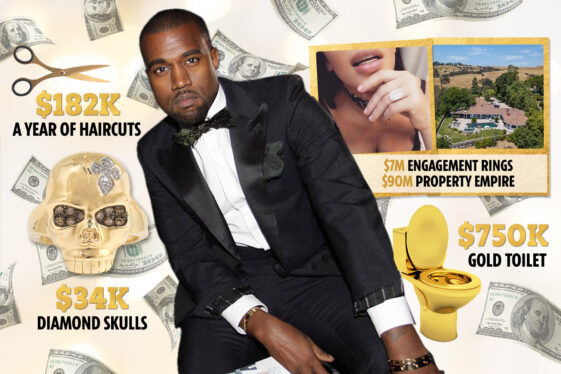In September 2020, Kanye West fired off a series of “NEW RECORDING AND PUBLISHING DEAL GUIDELINES” on Twitter, the app now known as X. He called for artist-friendly income splits — 80% to the musician — and contracts that are easy to understand. “The artist owns the copyright in the recordings and songs,” West proposed, “and leases them to the record label / publisher for a limited term.”
His new album Vultures 1, a full-length collaboration with the singer Ty Dolla $ign, arrives with even fewer strings attached — he doesn’t have a label partner, just a distribution company (Label Engine) to help ensure the music’s presence on streaming services. This arrangement outside of the major label system means that West and Ty Dolla $ign are likely taking home even more than the 80% cut the rapper tweeted about in 2020. Although Label Engine advertises that clients get 82.5% of revenue, stars like West almost certainly have the leverage to push that number significantly higher.
Billboard estimates that Vultures 1, which debuted at No. 1 on the Billboard 200, earned a little more than $1 million in its opening week in the United States, mostly from streaming (around $892,000 from close to 169 million on-demand streams) plus a little extra from sales (roughly $145,000). If West and Ty Dolla $ign are giving up 5% for distribution — which might be high — they take home around $986,000. (More when you factor in global streams and publishing.)
Contrast this with the situation West faced at the start of his career in the major label system: Images of old contracts he tweeted in 2020 indicate that when he made The College Dropout, he earned a 14% royalty on albums sold in the U.S. As is typical in a royalty deal, West’s old contract notes that “no royalties shall be due and payable… until such time as all advances have been recouped.” That recoupment comes out of an artist’s share, meaning that measly 14% rate has to do all the heavy lifting to earn the advances back.
In a theoretical example, if West was in this deal and he had just $1 million in recoupable expenses (such as an advance) associated with an album — which would be low for him, historically speaking — that release would need to generate more than $7 million in total sales income for him to recoup and start earning money from his music going forward. (In this simple hypothetical, an artist is only generating income through sales, not synchs or other ancillary sources, and the royalty rate isn’t increasing when an artist hits certain sales thresholds.)
To generate around $1 million in royalties for its creators, as Vultures 1 did for West and Ty Dolla $ign in just one week, the album stuck in a 14% royalty deal would then have to earn an additional $7 million in total sales revenue. Translated to on-demand streams, that would mean around another 1.3 billion plays.
Since West is no longer affiliated with a major label, the commercial success of Vultures 1 has been lauded on social media as a breakthrough moment for the independent sector. But while calling the rapper independent is technically accurate — he’s not working with a major label — it’s also misleading. Imagine if Lebron James retired and people started describing him as an amateur basketball player because he was no longer on an NBA roster.
The term independent gets thrown around a lot these days. gamma boss Larry Jackson recently called Usher “the first independent artist to ever play the Super Bowl.” (Usher, by the way, has the No. 2 album in the country with Coming Home.)
Both West and Usher built their superstar careers within the major-label system, however. They were thrown lavish budgets to make their albums. And they benefited from the full weight of the record companies’ promotional muscle at a time when those companies had a lot of influence over what the public heard.
In West’s case, images of recording agreements he tweeted in 2020 showed that Universal Music Group forked over an $8 million advance for Yeezus, along with another $4 million for recording and sample clearances. The contract photos also indicated that Universal was prepared to pay a $3 million advance and an additional $3 million for recording and clearances for The Life of Pablo. UMG also poured money into marketing and radio promo over the years. It’s hard to imagine West — who has since arguably become as well known for his troubling history of antisemitic comments, which have lost him numerous business deals, as for his music — reaching the level of cultural ubiquity he achieved without that investment from the majors.
And even if the rapper is enjoying a larger share of profits from his music these days, the real money may be coming to him from outside of the music industry: West recently claimed he made more than $19 million off of clothing sales in a single day.





